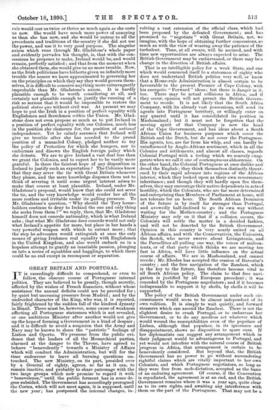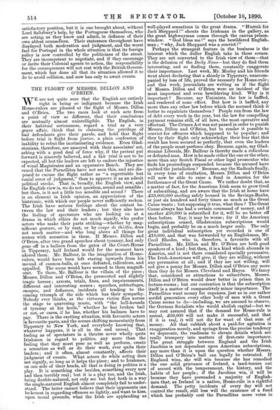GREAT BRITAIN AND PORTUGAL.
IT is exceedingly difficult to comprehend, or even to follow, the obscure course of Portuguese internal politics. They are believed to be greatly, though secretly, affected by the wishes of French financiers, without whose assistance the annual deficits could not be provided. for ; by quiet but unceasing pressure from Madrid ; and by the undecided character of the King, who was, it is reported, fairly frightened by the sudden fall of the kindred dynasty in Brazil. There must be, however, some cause of weakness affecting all Portuguese statesmen which is not revealed, or one ambitious Minister after another would not give up the hope of forming a Government in a kind of despair ; and it is difficult to avoid a suspicion that the Army and Navy may be known to share the " patriotic " feelings of Lisbon and Oporto. We presume from the public evi- dence that the leaders of all the Monarchical parties, alarmed. at the danger to the Throne, have agreed to behave " benevolently " towards a Ministry of Affairs which will conduct the Administration, but will for the time endeavour to leave all burning questions un- touched. The new Ministry, on its part, presided over by a General of eighty, agrees, so far as it can, to remain inactive, and probably to share patronage with the two large groups which now promise to regard it with "benevolence," until the public ferment has in some de- gree subsided. The Government has accordingly prorogued the Cortes, which will not meet again, it is supposed, until the new year; has postponed the internal changes, in- volving a vast extension of the official class, which had been proposed by the defeated Government ; and has promised to " negotiate " with Great Britain, not, we imagine, with the hope of obtaining further concessions, so much as with the view of wearing away the patience of the turbulent. Time, at all events, will be secured, and with time new opportunities are always expected to arise. The British Government may be embarrassed, or there may be a change in the direction of British affairs.
That is an intelligible policy for a weak State, and one which would commend itself to a statesman of eighty who does not understand British politics very well, or know that a Home-rule Administration is almost certain to be favourable to the present Premier of Cape Colony, with his energetic " Forward " ideas ; but there is danger in it. too. There may be actual collisions in Africa, and if they occur, opinion will not permit the British Govern- ment to recede. It is not likely that the South Africa Company, with its already vast possessions, will send its agents into Portuguese territory, or willingly enter on any quarrel until it has consolidated its position in Mashonaland ; but it must not be forgotten that the moving spirit of that Company is now the head of the Cape Government, and has ideas about a South African Union for business purposes which cover the British and the Dutch, but do not cover the Portuguese. His agents, too, are far from his whip, and can hardly be uninfluenced by Anglo-African sentiment, which in all the Colonies and settlements, and almost all classes, regards Colonial Portugal with a feeling which we scarcely exag- gerate when we call it one of contemptuous abhorrence. On the other hand, the Colonial Portuguese at once dislike and' dread the English ; they think themselves distinctly threat- ened by their rapid advance into regions of the African interior, which they looked upon as their own reversionary inheritance ; and though they will hardly open fire them- selves, they may encourage their native dependents in acts of hostility, which the Colonists, who are far more determined and enterprising than Members of Parliament at home, will not tolerate for an hour. The South African Dominion of the future is by itself far stronger than Portugal, and avowedly half-inclined to go its own way without waiting for the Mother-country ; and the Portuguese Ministry may rely on it that if a collision occurs, the Colonists will settle the matter in a decided fashion, and will not be deserted by the British Government. Opinion in this country is very nearly united on all African affairs, and with the Conservatives, the Unionists, the Scotch, who never swerve about Livingstonia, and the Parnellites all pulling one way, the voices of malcon- tents, or of that party which thinks we are moving too fast in Africa, will have little influence on the actual course of affairs. We are in Ma,shonaland, and. cannot recede ; Mr. Rhodes has accepted the cession of Baroutse's country ; and. the free navigation of the Zambesi, which is the key to the future, has therefore become vital to all South African policy. The claim to that free navi- gation is justified by all European precedent ; it was conceded by the Portuguese negotiators ; and if it becomes indispensable to support it by shells, by shells it will be supported.
The policy of the British Government under such cir- cumstances would seem to be almost independent of its own volition. It is simply to wait quietly, and forward steamers which can ascend the Zambesi. There is not the slightest desire to crush Portugal, or to embarrass her Government, or to do any needless act whatever which would. wound the susceptibilities even of the populace of Lisbon, although that populace, in its ignorance and disappointment, shows no disposition to spare ours. If her diplomatists can suggest any arrangement which in their judgment would be advantageous to Portugal, and yet would not interfere with the natural course of British progress in Africa, that arrangement is certain to be benevolently considered. But beyond that, the British Government has no power to go without surrendering rightful claims which are vitally important to her own. Colonists, and which Portuguese negotiators, so long as they were free from mob-dictation, accepted as the basis of an enduring agreement. Of course, if the Convention is repudiated, the agreement is at an end, and. the British Government remains where it was a year ago, quite clear as to its own rights, and awaiting any interference with them on the part of the Portuguese. That may not be a. satisfactory position, but it is one brought about, without Lord Salisbury's help, by the Portuguese themselves, who are acting, as they know and admit, in defiance of their own ablest counsellors. Their statesmen throughout have displayed both moderation and judgment, and the worst fact for Portugal in the whole situation is that its foreign policy is now controlled by the politicians of the street. They are incompetent to negotiate, and if they encourage or incite their Colonial agents to 'action, the responsibility for the consequences will not rest with the British Govern- ment, which has done all that its situation allowed it to do to avoid collision, and now has only to await events.







































 Previous page
Previous page